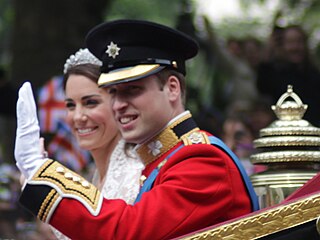
A gift or present is an item given to someone without the expectation of payment or anything in return. Although gift-giving might involve an expectation of reciprocity, a gift is intended to be free. In many countries, the act of mutually exchanging money, goods, etc., may sustain social relationships and contribute to social cohesion. Economists have elaborated the economics of gift-giving into the notion of a gift economy. By extension, the term gift can refer to any item or act of service that makes the other happier or less sad, especially as a favor, including forgiveness and kindness. Gifts are often presented on occasions such as birthdays and holidays.

William, Prince of Wales, is the heir apparent to the British throne. He is the elder son of King Charles III and Diana, Princess of Wales.

A donation is a gift for charity, humanitarian aid, or to benefit a cause. A donation may take various forms, including money, alms, services, or goods such as clothing, toys, food, or vehicles. A donation may satisfy medical needs such as blood or organs for transplant.

Tzedakah is a Hebrew word meaning "righteousness", but commonly used to signify charity. This concept of "charity" differs from the modern Western understanding of "charity". The latter is typically understood as a spontaneous act of goodwill and a marker of generosity; tzedakah is an ethical obligation, and it is not properly "charity", like in Christiandom, but a way to empower poor people to support themselves, helping them in developing their talents and skills.

Internet fraud is a type of cybercrime fraud or deception which makes use of the Internet and could involve hiding of information or providing incorrect information for the purpose of tricking victims out of money, property, and inheritance. Internet fraud is not considered a single, distinctive crime but covers a range of illegal and illicit actions that are committed in cyberspace. It is differentiated from theft since, in this case, the victim voluntarily and knowingly provides the information, money or property to the perpetrator. It is also distinguished by the way it involves temporally and spatially separated offenders.

Fundraising or fund-raising is the process of seeking and gathering voluntary financial contributions by engaging individuals, businesses, charitable foundations, or governmental agencies. Although fundraising typically refers to efforts to gather money for non-profit organizations, it is sometimes used to refer to the identification and solicitation of investors or other sources of capital for for-profit enterprises.

Street fundraising consists of various ways of asking for donations on behalf of a charity. Those asking for donations may be paid employees of the charity, or they may be volunteers.

Catherine, Princess of Wales, is a member of the British royal family. She is married to William, Prince of Wales, heir apparent to the British throne.

Etiquette in Japan forms common societal expectations of social behavior practiced throughout the nation of Japan. The etiquette of Japan has changed greatly over the millennia as different civilizations influenced its culture. Modern Japanese etiquette has a strong influence from that of China and the Western world, but retains many of its unique traditional elements.
Gift Aid is a UK tax incentive that enables tax-effective giving by individuals to charities in the United Kingdom. Gift Aid was introduced in the Finance Act 1990 for donations given after 1 October 1990, but was originally limited to cash gifts of £600 or more. This threshold was successively reduced in April 2000 when the policy was substantially revised and the minimum donation limit removed entirely. A similar policy applies to charitable donations by companies that are subject to the UK corporation tax.
In the United States, a donor-advised fund is a charitable giving vehicle administered by a public charity created to manage charitable donations on behalf of organizations, families, or individuals. To participate in a donor-advised fund, a donating individual or organization opens an account in the fund and deposits cash, securities, or other financial instruments. They surrender ownership of anything they put in the fund, but retain advisory privileges over how their account is invested, and how it distributes money to charities.
Etiquette rules in the United States and Canada generally apply to all individuals, unlike cultures with more formal class structures, such as those with nobility and royalty.
A foundation in the United States is a type of charitable organization. Though, the Internal Revenue Code distinguishes between private foundations and public charities. Private foundations have more restrictions and fewer tax benefits than public charities like community foundations.
Payroll Giving, Workplace Giving or Give As You Earn (GAYE) is a scheme for UK taxpayers to donate money to UK Registered Charities.

Mishloach manot, or shalech mones, and also called a Purim basket, are gifts of food or drink that are sent to family, friends and others on Purim day. The mitzvah of giving mishloach manot derives from the Book of Esther. It is meant to ensure that everyone has enough food for the Purim feast held later in the day, and to increase love and friendship among Jews and their neighbors.

Charitable trusts in English law are a form of express trust dedicated to charitable goals. There are various advantages to charitable trust status, including exemption from most forms of tax and freedom for the trustees not found in other types of English trusts. To be a valid charitable trust, the organization must demonstrate both a charitable purpose and a public benefit. Applicable charitable purposes are normally divided into categories for public benefit, including the relief of poverty, the promotion of education, the advancement of health and saving of lives, the promotion of religion, and all other types of trusts recognized by the law. There is also a requirement that the trust's purposes benefit the public, and not simply a group of private individuals.

The wedding of Prince William and Catherine Middleton took place on Friday, 29 April 2011 at Westminster Abbey in London, England. William was second in the line of succession to the British throne at the time, later becoming heir apparent. The couple had been in a relationship since 2003.

Philanthropy in the United States is the practice of voluntary, charitable giving by individuals, corporations and foundations to benefit important social needs. Its long history dates back to the early colonial period, when Puritans founded Harvard College and other institutions. Philanthropy has been a major source of funding for various sectors, such as religion, higher education, health care, and the arts. Philanthropy has also been influenced by different social movements, such as abolitionism, women’s rights, civil rights, and environmentalism. Some of the most prominent philanthropists in American history include George Peabody, Andrew Carnegie, John D. Rockefeller, Henry Ford, Herbert Hoover, and Bill Gates.

The Royal Foundation of The Prince and Princess of Wales is an independent United Kingdom-based charity which supports the non-profit work of the Prince and Princess of Wales. Their projects revolve around conservation, environmental issues, early childhood development, mental health, emergency services, and homelessness.
Earning to give involves deliberately pursuing a high-earning career for the purpose of donating a significant portion of earned income, typically because of a desire to do effective altruism. Advocates of earning to give contend that maximizing the amount one can donate to charity is an important consideration for individuals when deciding what career to pursue.














